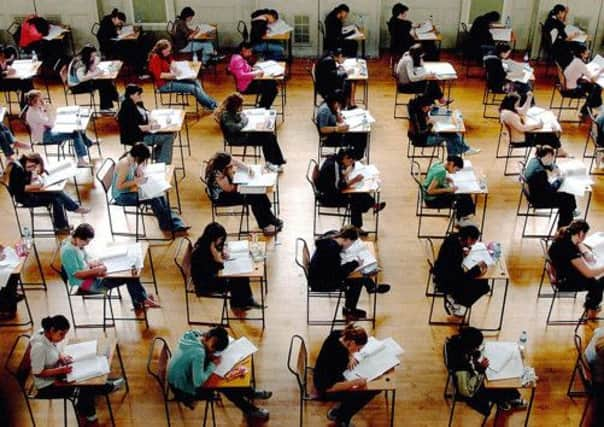Highers pupils’ writing criticised by examiners


The Scottish Qualifications Authority said its markers had found it “extremely difficult and time-consuming” to mark parts of the English exams.
The authority stated that no paper would ever be left unmarked but that schools had to “do their best to reduce this problem by making alternative arrangements for some candidates”, with the use of laptops thought to be among the options.
Advertisement
Hide AdAdvertisement
Hide AdEducation academics said the comments reflect a pattern as pupils spend less time on writing and more with computers, smartphones and tablet devices.
In addition to difficulties in marking such work, research has found many pupils are held back by such an impediment when it comes to getting their points across in essays.
Professor Steve Strand, an education lecturer at St Cross College, Oxford, told The Scotsman: “Our research a few years back found that for some pupils, particularly boys, handwriting isn’t automatic and as a result they spend some of their resources on the mechanics of composing the writing, rather than the content.
“If the difficulties are such that you have dyspraxia, there can be measures put in place to allow you to have a laptop, but there are obviously a lot of people outwith that who struggle with handwriting.”
He added: “There is a renewed focus on the rules of punctuation and grammar but it does seem that emphasis is no longer on handwriting as much, and that’s no doubt down to the changing nature of the world.”
Larry Flanagan, general secretary of the Educational Institute of Scotland, and a former principal teacher of English, said there is a recognised issue over the writing ability of many pupils, but that alternative arrangements have diminished in recent years.
He said: “One of the issues for candidates in Higher English is that a few years back the SQA tightened its guidance.
“In the past pupils might have had additional time and a word processor or even a scribe, but this was changed so that the school has to give evidence that this support had been in place throughout the course, to ensure the pupil needed such a facility.
Advertisement
Hide AdAdvertisement
Hide Ad“And because not many schools can offer a laptop or especially a scribe every day, they don’t usually meet that guideline, and so fewer people are entitled to these arrangements come exam time.”
Mr Flanagan added that with classroom assistants being cut back, the focus has largely shifted away from addressing the handwriting issue.
Dr Andrea Webb, chair of the National Handwriting Association, said that, south of the Border, there is a renewed focus on handwriting.
She said: “The concerns we have are that handwriting is a skill that needs to be taught, but that the younger generation of schoolteachers have never really done so because it was omitted from the curriculum for some years.
“In addition, not every school can afford to give pupils a laptop, and that’s why we need to ensure pupils are given the necessary time and teaching.”
Mary Scanlon, education spokeswoman for the Scottish Conservatives, said schools should not abandon traditional skills. “It’s not something we can afford to slip back on. I appreciate in an age of advanced technology that some may think it’s less important, but there will always be a place for skills such as this.”
Senior examiners today published assessments of this summer’s exams and reflect on how pupils fared against previous years.
Although they welcomed results which saw 74 per cent of pupils gain A-C grades in Higher English, among the criticisms was that entrants were needlessly failing because of “non-existent proof-reading”.
Advertisement
Hide AdAdvertisement
Hide AdIn a third point, markers said that entire classes “had been set identical tasks” for some classroom-based exams, though it is understood that this is often done with less able pupils to ensure a pass.
Examiners wrote: “In an exercise designed to encourage personal choice and individual interests, this is very unlikely to generate work of quality.”
Dr Gill Stewart, SQA director of qualifications development, said “Every year SQA principal assessors produce an External Assessment Report based on candidate performance in that year’s national courses. The reports highlight examples of successful performance and provide advice and guidance for teachers and lecturers on how to prepare future candidates.
“Within this year’s Higher English report, the Principal Assessor, says that there is some evidence of whole classes doing identical writing tasks within their folio of writing. The folio part of the course is designed to encourage candidates to write about areas that interest them as this should allow them to generate their best work. Therefore the Principal Assessor advises teachers and lecturers to consider giving candidates more personal choice about the topic of writing for their final folios. “However, SQA recognises that this may not always be practical. “ With the Discursive Writing course, markers lamented the “limited range of topics” chosen, including many on cosmetic surgery and size zero models, which they claimed demonstrated “a disappointing sameness about most of these essays and little sense of real engagement”.
On Standard Grades, examiners said that traditional written texts were often eschewed in favour of films, including “Luhrman’s Romeo and Juliet, Titanic, Jaws, Stand by Me, Braveheart or Pan’s Labyrinth”.